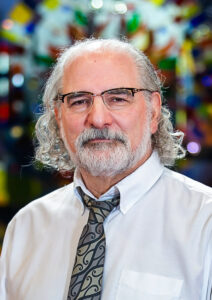By Lee Chottiner
Managing Editor
After 34 years at The Temple, Rabbi Joe Rooks Rapport is retiring in a fitting way: He is being its rabbi.
In addition to being the guest of honor at the congregation’s May 21 celebration of his career, he also is slated to officiate at some weddings and b’nai mitzvah – some for families he has known for years.
“It’s been a real blessing to be in the same congregation, to raise children, see them grow up and raise children of their own,” Rapport said in an interview with Community. “That’s been the real blessing of being here so long.”
Many rabbis do not get that blessing, moving between three, four or even more pulpits during their rabbinates. But aside from four years as a part-time rabbi in St. Louis while earning his Ph.D. at Washington University, Rapport has never served another congregation.
“I call this my first real job,” he said.
And he spent most of it working side by side with his wife, Rabbi Emerita Gaylia R. Rooks, with whom Rapport trained for the rabbinate. They were even ordained together in 1984 – a first for the Reform Movement and possibly for organized Judaism.
“We were able to work together as a team for the majority of our rabbinates, which is an unbelievable blessing,” Rapport said.
Raised in Michigan, Rapport joined the Temple eight years after the merger of Adath Israel and Brith Sholom. Since then, he’s seen even more change, not the least being in the past two years when The Temple, like every congregation, has grappled with how to keep Jewish life vibrant during a pandemic. “One of my undergraduate degrees was in computer technology,” Rapport said, “but I never imagined that would be so large a part of my rabbinate these past two years of COVID and needing to lead the congregation into an online kind of role.”
Rabbi David Ariel-Joel said Rapport, his colleague of 20 years, has been integral during this period, “reinventing … how to teach, lead services and lifecycle events, providing rabbinical services and creating vibrant and active Jewish life in a virtual world that was forced on us overnight. I could not do this without him as a partner, a colleague and a friend.”
A classical Reform congregation when Rapport arrived (he prefers “Southern Reform” – spoken with a drawl), The Temple services were done largely in English with a choir.
That, too, has changed, he said. The choir is still a major component, but he said services have moved closer to the “mainline” of the movement.
The face of the congregation is also different.
“When I first came, it was much more l’dor v’dor (generation to generation),” Rapport said. “Generationally, a lot of members of the Temple were the children, grandchildren and great-grandchildren of our founders.”
He recalled the 150th anniversary celebration when the president of the sisterhood, Ann Friedman, from the bima, asked all members who were descendants of founders to please rise.
“More than 100 people stood up,” he said.
“Today, we’re a more diverse congregation, I think…, people coming from other streams of Judaism, people coming from outside of Louisville. And ethnically, we’re more diverse.”
Coming to The Temple after his Ph.D. studies, Rapport taught at the local seminaries and universities as well as the children, adults and seniors of his new congregation, delving into social justice, tikkun olam and the history of Jewish Louisville.
In other words, he had his dream job.
“The term rabbi really does mean teacher to me, and my teaching from preschool to adult and senior education and in the community has been the thing that has occupied most of my rabbinate.”
One of the great joys of his career was his work with The Temple archives, a job that he plans to continue in retirement.
“I use the archives a great deal,” he said, “to be able to give tours to groups, to use it for research in my classes and to engage congregants and be part of a historical congregation such as ours.”
He’s witnessed much of that history, watching multiple generations grow up at The Temple.
“Children I’ve named, for whom I’ve also done bar and bat mitzvah or done weddings. Several of the young people who have grown up in our congregation have become rabbis.”
One of those homegrown rabbis was Yael Rapport, daughter of Rabbis Rapport and Rooks, and currently an associate rabbi at Beit Simchat Torah in New York. She said both her parents inspired her career.
“My father’s love and passion for Jewish history and Jewish stories have deeply shaped the rabbi I have become,” Yael Rapport said. “Whether in a classroom or around a campfire, his joy in teaching and sharing these stories is nothing short of magical. Everyone deserves a teacher like my father.”
Rapport and Rooks plan to stay in Louisville now that both are retired, but they will be hitting the road to visit friends and family. Rapport said he may continue performing occasional lifecycle events – especially when requested. He may even find time to fish, something he enjoyed while growing up in Michigan.
“I’ve been looking forward to his retirement with great anticipation,” Rabbi Gaylia Rooks said. “I know some people say they married for better or for worse but not for lunch, but we love being together.”
In retiring, Rapport urged his congregation to continue to remain “radically inclusive,” not only of communities that haven’t historically felt welcomed in synagogues – LGBTQ, ethnic groups, interfaith families – but of new generations of Jews who don’t make the synagogue part of their lives.
“‘Welcoming’ used to mean our doors are wide open; that was the term that was used,” he said, “but that assumes people are going to walk through that door…. Overtime, we have learned that we have to be reaching out past just having open doors.”



